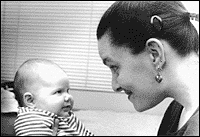Scientists in the Crib Use Adults as Lab Rats
By Patricia McBroom, Public Affairs
Posted August 25, 1999
 Lauren Baldock-Wood studies the expressions and actions of her mother, Anne Wood. New research shows that infants have brains that are smarter, faster and busier than adults. Peg Skorpinski photo. |
Actually, it has the greatest mind in the universe in the process of solving major philosophical questions with a brain that is smarter, faster and busier than any adult's, according to new research published in a book co-written by a Berkeley professor who is a leading cognitive psychologist.
"It is remarkable how much little children know and how much they learn in a short time," said Alison Gopnik, a professor of psychology.
"If you combine the psychological and neurological evidence, it is hard to avoid concluding that babies are just plain smarter than we are, at least if being smart means being able to learn something new."
The new research is detailed in "The Scientist in the Crib: Minds, Brains and How Children Learn," a look at understanding how a child's mind grows.Co-written by the University of Washington's Andrew Meltzoff, a pioneer in infant psychology, and Patricia Kuhl, a world authority on language development, the book makes clear that what society does for preschoolers will affect not only the lives of those children but the future of the world as well.
Before preschoolers enter kindergarten, their brains are more active and more flexible, with more connections per brain cell, than the brains of adult human beings, the researchers discovered. By age three, the child's brain is actually twice as active as an adult's. It has some 15,000 synapses or connections per neuron, many more than the adult brain.
Gopnik said that, contrary to traditional beliefs about children, toddlers do think in a logical manner, arriving at abstract principles early and quickly.
"They think, draw conclusions, make predictions, look for explanations and even do experiments," said Gopnik. In fact, scientists are successful precisely because they emulate what children do naturally.
Gopnik's work is based on more than 10 years of observation and research with toddlers at the Harold E. Jones Child Study Center, an arm of the Institute of Human Development. That work has been combined with Meltzoff's discoveries about an infant's knowledge at birth and Kuhl's brain research on language development.
Their book is written in lay language to bring these new discoveries to parents, but the research also has implications for new educational programs being considered at the federal and state level for preschoolers.
"Our research shows that the attention of caring, nurturing grown-ups is extremely important for the learning of babies from birth. But we are doing nothing as a society to ensure that children get that kind of attention," Gopnik said.
Gopnik and her co-authors do not recommend new educational schemes for preschoolers, such as flash cards and Mozart tapes, noting that there is no evidence any environment can be artificially created to make people brighter or better.
"But there is plenty of evidence that deprivation makes them worse," she said, adding that it is not enough to just feed children and put them to bed.
Parents and other adults "need the time and energy to exercise their natural ability to help babies learn," said Gopnik. "We should do what we do best -- talk, play, make funny faces, pay attention. We just need time to do it."
"Artificial interventions are at best useless and at worst distractions from the normal interaction between grown-ups and babies," the authors write in their book.
Gopnik and her colleagues argue that evolution has designed the brains of babies and the behavior of adults to interact in such a way that children move through specific stages in the first few years of life, learning from adults about emotions, physical objects and language.
The baby's first task, for instance, is to learn about human emotions and psychology. Beginning from a base of synchrony in the first year, when babies think all other minds want the same things they do, they discover at about 18 months that people are different. Thus begin the "terrible twos," when toddlers explore differences by deliberately doing the things their parents tell them not to do.
"Their behavior is quite rational," said Gopnik. "Toddlers are systematically testing the dimensions on which their desires and the desires of others may be in conflict. They may stare gravely at you while they head for a forbidden object, because your reaction is the really interesting thing. The child is a budding psychologist. We parents are the laboratory rats."
"Human children in the first three years of life are consumed by a desire to explore and experiment with objects," write the authors. "They are like scientists. The crib, the house and the backyard are excellent laboratories."
![]()
![]()
August 25 - 31, 1999 (Volume 28, Number 3)
Copyright 1999, The Regents of the University of California.
Produced and maintained by the Office of Public Affairs at UC Berkeley.
Comments? E-mail berkeleyan@pa.urel.berkeley.edu.